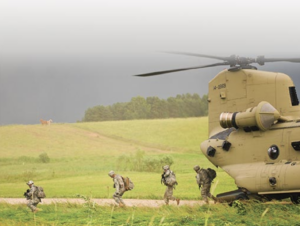
Soldiers from the Minnesota Army National Guard on an exercise with British, Polish, and Lithuanian forces, in the Suwalki Gap in southern Lithuania, 2017. The Gap has been called the new Fulda Gap. (Photo courtesy of the 1st Armored Brigade Combat Team, 34th Infantry Division, Minnesota Army National Guard Public Affairs)
It has been strange, this last week, to feel as if the fears of the early ‘80s had skipped over several decades and landed in our time to confront us.
When I was a young soldier, in the Reagan-Bush era, we used to shoot at Soviet soldier-shaped outlines at the range. Back then, it was an M-16 versus an AK-47 world, and our army still trained for WWII-style land battles in Europe. One of my roommates had been one of those guys meant to man-carry a tactical nuclear weapon into battle to keep Russian tanks from pouring through the Fulda Gap.
A lot changed. Our armed forces became lighter, faster, more mobile. The identity of our known and presumed enemies changed. We even held military exercises over the years with Russia. Reagan’s view of Russia changed over time too, of course, especially as it became less of a perceived threat and more a growing trading partner.
This week has felt like 1982 all over again. In fact, it may be worse, as weapons are deadlier, population density greater, infrastructure bigger, and the world more interconnected. Things are so bad, in terms of potential world-scale conflict, that Germany says it will spend four times last year’s defense budget on military investments this year, and the Swiss have chosen not to stick to neutrality in all things.
Maybe the surest indication we have leapt back in time is that many of the American veterans I know on social media, who became vaguely pro-Putin when they became pro-Trump, are incensed by the invasion of Ukraine and have returned to Reaganite frames of mind. I posted about the Snake Island takeover on a Facebook page for ex-military divers, which has UK and European group members, and they said the Russian warship “would make a good reef on the bottom.”
“Would be nice if there’s a US sub in the Black Sea to slam a MK 48 Torpedo into it,” one said.
Another: “Moskva Cruiser, sink the bast—-s.”
There were still divisive thoughts in some posts—“How do we know that Putin is not wagging the dog, and taking the focus off of the failed Cvd-19 narrative? We all know we cannot trust American media. No way man”—but, generally, few seem to have continued to follow Trump’s admiration for authoritarianism wherever it resides.
Few in that group and elsewhere jumped in to say they would fight in Ukraine, either. I was anticipating someone putting together a group to go (as US veterans went to Standing Rock in 2016), and I did finally see one such group start to organize on Facebook on Sunday morning, just as President Zelensky made a call for volunteers for an international legion to help defend Ukraine. The US publication Military Times even gave instructions for joining up.
But there are difficulties, ranging from questions of whether the US allows its citizens to fight for foreign armies, to whether life insurance policies would pay out if volunteers were killed in crisis zones, or how their bodies would be brought home to loved ones. Would-be volunteers were told to contact the Ukrainian embassy in DC to apply, but its website went down, and there seems to be something of a concerted effort that this not be made easy. The British Foreign Secretary said she was in favor of UK citizens being allowed to go fight; the Defence Secretary countered her.
And now that the Russians are invading a country with aspirations to being in NATO, most of the Cold War vets on social media—even many of those who wanted to be seen as hard men, ready for American civil war—seem to feel their time has passed anyway.
“You’ve got plenty of years left in you for adventures!” one veteran told a younger group member. “My last stand will [be] here on overwatch for my family if Putin goes really nuts and starts hitting buttons. But I’m moving a lot slower than you. Kick some butt and save some of those poor people Brother! Until Valhalla!”
If the thought of Cold War US military veterans fighting Russians in the streets of Kyiv makes you sweat a little, as it does me, then consider that a few hours ago Roger Zakheim, the director of the Ronald Reagan Presidential Foundation and Institute, and former general counsel for the House Armed Services Committee, told the Senate Armed Services Committee that we should consider “the possibilities of having American intelligence provide more direct assistance to the Ukrainian military, including potentially on the ground operatives.” These would probably be Special Forces troops or their CIA equivalents, to perhaps advise or provide intelligence, but also to “sabotage the roads,” according to the Times. Several senators were interested.
Individual countries in NATO providing assistance (money, arms, materiel) to the Ukrainians walks a fine line, as Putin threatens and watches closely for interference, but there is much being given and certainly more to come.
The Fulda Gap was thought to have lost its significance (see here for a possible replacement) after the Soviet Union broke up, but then many of us had also grown accustomed to not seeing “a conventional move like this, nation-state to nation-state,” as a US senior defense official told CNN Thursday, and “certainly nothing on this size and scope and scale.” It is, in fact, “the largest conventional military attack that’s been seen since World War II,” the official said. And a return to old fears.
